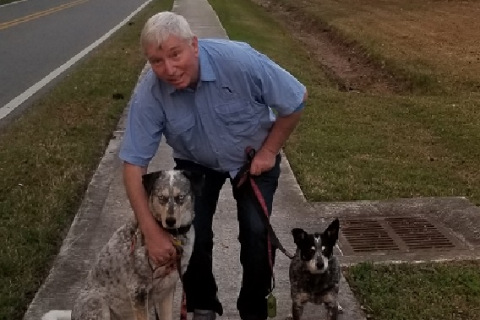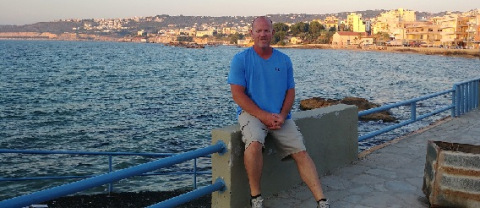Mesothelioma Journeys: Storms, Setbacks, Support and Survival

Fact Checked | Written by: Michael Cole | Last Update: 04/02/2025 | 6 Min Read
You’ve likely heard it said that every person is either going into a storm, is in the midst of a storm or they’re coming out of a storm. Most of us can easily relate in our own lives, but sometimes we forget that we don’t know what storms others are in right now.
As we go through these storms in our lives, it can feel isolating and overwhelming. Being mindful that we’re all going through storms can help us remember to give each other, and ourselves, grace.
Connecting with others facing similar storms can help us feel less alone. It’s an opportunity to support one another. Through my writing here, I hope sharing my personal insights with the mesothelioma community as someone who has been in the midst of the storm is helpful.
Joining support groups, such as The Mesothelioma Center’s private Facebook support group or their online support group, can create important community to help us weather what we’re going through and what’s ahead.
Reminder We Don’t Know What Storms Others Face
One day at MD Anderson Cancer Center, my wife and I were waiting for a shuttle to take us back to the motel we were staying at during my mesothelioma treatment. My wife went to walk around while I sat in a waiting area. A man and a woman were sitting on a couch near me. They seemed a bit grouchy with each other, just enough that I noticed.
In that moment, I made an assumption. I thought to myself, “The caregiver could cut the other person some slack.” When they walked away, I saw a wallet under the couch they’d been sitting on. I got up, picked it up and found the couple.
They thanked me and we talked for a moment. They shared they were both undergoing treatment there. The husband was diagnosed first with one type of cancer and then his wife with another.
I was struck almost speechless. My attitude instantly went from “They should do better” to “I can’t imagine how they manage at all.” This was a powerful reminder that you really don’t know what someone is going through and how important it is to be kind. And we should extend that same kindness to ourselves.
Caring for Others While on Your Own Cancer Journey
The couple at MD Anderson were both simultaneously survivors and caregivers, supporting each other. Similarly, I experienced another example of a cancer patient offering others care.
My first mesothelioma specialist was treatment pioneer Dr. David Sugarbaker. He was a great blessing to me and my wife in so many ways, both treating me and giving us encouragement.
My visits with him became less frequent as my treatment progressed from mesothelioma surgery to other methods. We didn’t realize until our last visit with him that he was ill. We could tell something was wrong and my wife asked him about his health. His last words to us were, “They’ll tell you I’m sick, but don’t listen to them.”
We learned later, after he passed away, that he had been battling cancer. He continued to be concerned about everyone else and he didn’t want us to worry about him.
Not a bad example to follow, I think. Continuing to find ways to help others can help us focus on something beyond our own challenges when coping with a mesothelioma diagnosis.
My Personal Story of Setbacks and Hope
In thinking about storms and where others may be in their journey, I’m reminded that it’s also important to remember that where we are right now can change. When I faced my own setback, I was able to find renewed hope.
My pleural mesothelioma diagnosis was a significant setback shortly after the joys of marrying my beautiful wife and starting a new job I really liked. It began a storm of aggressive treatment and challenges.
I underwent an extrapleural pneumonectomy with heated chemotherapy in the affected area. That was followed a few months later with platinum-based chemotherapy performed over a number of weeks.
These treatments went as planned, though each was difficult in its own way and recovery was challenging. In the ensuing months I had regular scans to check for recurrence. Time passed, and with each new clean scan, our optimism slowly increased; but I have to admit that I was afraid to be too optimistic.
More than anything, I just tried not to think about it. As we approached the 2-year mark, my doctor made the observation that this seemed to be an important milestone in measuring the probability of recurrence. If no new tumors appeared within 2 years, the probability of long-term remission increased greatly.
As I approached that test, I couldn’t help but my optimism ramped up. At exactly the 2-year mark, the scan showed that the cancer was back. The doctor told us that the mesothelioma recurrence was in the scar tissue of the EPP incision and should be a simple operation. We knew that recurrence after the EPP and chemo indicated a much poorer prognosis for long term remission, but we hoped this would be a minor setback.
We gathered our strength, reaffirmed our hope and moved forward. Unfortunately, the cancer also moved forward. It continued to spread, and soon surgery was no longer a viable option in my doctor’s opinion. To take the platinum-based chemo again was the next step advised.
We felt the full weight of sadness come crashing back down upon us. Expectations were that it would probably extend my life 1 to 2 years. It seemed like it might be the end of the road for me. It was a difficult time for us. However, when we went back to our mesothelioma specialist, he had another trick up his sleeve.
He told us that he was collaborating with another doctor to use targeted radiation in conjunction with immunotherapy for mesothelioma. Study samples were few at the time, and results of effectiveness were inconclusive, but this gave us renewed hope.
That was 5 years ago. I haven’t had a recurrence in about 2.5 years. Will the cancer come back? Who knows? All we can do is make the most of the time we have. If setbacks come, we’ll keep moving forward.





